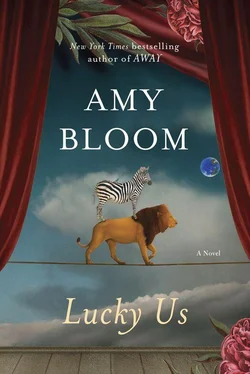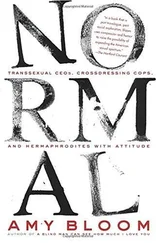She sat me down in her office. A civilized person would have offered me tea or a cold drink. I could hear my father’s voice rocketing through me, sitting with her. She didn’t say a thing. She smiled at me, in a new way. My mother, as was, smirked at the world and grinned when I had amused her, and she used to have, for my father, a very soft look. Her smile now was false and pearly, prissy and ecstatic. And frightening.
“I missed having a mother,” I said. Go for broke, I thought.
“How old are you?” my mother said.
“I’m twenty-one.”
“I was fifteen when I had you.”
I have to say, she looked great. She looked better than me. Her hair was blond now, her brows were still dark, and she didn’t have a line on her face. The gray silky thing she wore did a good job of showing off her assets and covering what looked like a pretty big caboose.
“How could you leave me on that porch,” I said.
“I was twenty-seven. I gave you more than enough years, didn’t I, and you know I took good care of you.” And she had. “You seem fine. I wasn’t cut out for teenagers. Plus, your father and I were going to be finished sooner or later, and my money was on sooner. And when he was done with me, baby, he’d be done with you. I know the type. I did you a favor.”
It was hard to concentrate on what she was saying, when she looked the way she did, and she kept her voice low, and soft. There were seraphim painted on the wall behind her.
“Call me impulsive. It worked out,” she said.
I couldn’t ask her anything. There wasn’t a single question to which I’d get the answer I wanted. The wicked people of the world are not supposed to be calm and composed. They are supposed to have hysterics and take poison like Hitler and Göring, or fall on their swords like the Japanese soldiers when they had to surrender. They are not supposed to cross one leg over the other and show off their white stockings and nice ankles.
“How is your father?” she said.
The greatest struggle in my life is between a dignified silence and having my say.
“Dead,” I said. “Of heartbreak.”
“Not over me,” she said.
I stood up. My mother sat for another second, looking at nothing, and then she stood up too. We were, not surprisingly, about the same height. She walked me back through the auditorium and down the fake marble hall. The man in the white robe was waiting for me.
“Are you staying long in Chicago?” she said.
“On my way even now,” I said.
“If you want to see a show—”
“See your show?” I said. “I wouldn’t piss on you if you were on fire.”
That was the only part I felt good about, afterward.
BACK HOME, I GAVE Francisco the highlights, after Danny went to sleep.
“People,” he said. “They can’t be underestimated.”
We drank our beers.
“Carnie called me. She got elected president of the PTA, in Rye,” he said.
“That’s a good thing to do,” I said, and we laughed.
He told me that Bea and Carnie had closed La Bella Donna. He said it’d be a lot harder for us all to get together. Plus, he said, what with the dentist and the little girl, Bea’s new husband and their new baby.
“Even if I don’t see them for years,” I said, “I’m always going to be really happy to see them.”
“They ask after you,” Francisco said. He raised his beer bottle toward me. “I say you’re making money, raising Danny, and living right.”
THE THIRD THURSDAY OF THE MONTH WAS MRS. RONSON’S DAY. She was twenty-five and looked forty. She dragged herself up my stairs, every month, to talk about her dead baby daughter. Linda had died in her crib a year ago. They tucked her in at night and in the morning, Mrs. Ronson found her blue and still. The doctors had nothing useful to say. Mrs. Ronson paced around my room at every visit. She talked about how angry she was at God, and at the doctors, and at her husband, and she talked about trying to get pregnant.
I flipped over the cards because she expected me to, and as soon as I got to a card with a man on it I said, “You have to forgive your husband. He’s grieving too.” I turned over the Ace of Wands, upside down, and said, “You won’t get pregnant as long as you’re so angry with your husband.” Last month, she asked me to contact her daughter. I said Linda couldn’t send a message, because she was just a baby. But I threw my head back and gurgled and leaned from side to side, rocking my chair. When I sat up I said Linda was beautiful and happy. I saw her. She wore her little yellow romper with the ducks on it. She was playing with other little children, on a big blanket, in a great green field. I felt worse for Mrs. Ronson than for anyone else I read for, and I wished she wouldn’t come.
She was a few minutes late for her third Thursday and she was transformed. She had lipstick on and a pretty shirtwaist and she’d pushed her sunglasses on top of her head, like a movie star. She looked at my cloudy-sky windows and tossed her purse onto a chair.
“Gosh, it’s a little gloomy in here.”
I shuffled the deck and put it in front of her.
She smiled and held the deck, shaking it like a martini.
Mrs. Ronson told me she was pregnant. She said she owed it all to me. She giggled. She said that, of course, her husband deserved some of the credit. She’d been talking to her husband about me. She said Mr. Ronson worked for the FBI and she said that he was one of the head men for missing persons in New York. It’s been nearly ten years since they declared Judge Crater dead, Mrs. Ronson told me, and almost twenty years since the judge disappeared. It was a very big case, she said. I started to shuffle the deck but Mrs. Ronson put her hand on my wrist.
“I told Ted how good you are,” she said. “I told him how you’ve found things for people, you found those diamond earrings for a friend of mine, and how you even found that missing girl.”
I’d found Mrs. Cohen’s earrings by making her trace her steps from Best & Co., where she’d tried on six suits, to her driver taking her home, where she drank too much, waiting for her husband to get home, and fell asleep on the wicker couch in the sunroom. The earrings were caught under a cushion. I’d found the runaway, a young woman living in the Village, waitressing at Caffe Reggio, and sleeping around, but I did that by thinking about what I would do if I’d had the girl’s money, and her awful parents.
“They’re doing a big search for Judge Crater. With a psychic from Interpol. Ted said I should ask you if you’d like to come along and assist. He said he’d talk to you and if you were cleared, you could assist. And get paid.”
I SHUFFLED THE CARDS as Mr. Ronson came up the stairs. He had questions and questions and forms for me to sign. I would have said no but my whole body lit up with yes at the sight of Mr. Ronson. I wasn’t going to sleep with him. I wasn’t even going to flirt with him. I was so tired of baloney sandwiches and lost eyeglasses and paying the bills and the greatest pleasure of my life being tetherball with Danny and the occasional neck rub from Francisco. I just wanted to hike along behind big Ted Ronson, and watch the sweat come down his thick neck, watch his hard shoulders press against his suit jacket. I wanted to watch him swagger up the dirt trails in the Catskills as we looked for Judge Joe Crater, Good Time Joe, once of the New York Supreme Court, last seen getting into a cab on an August night in midtown Manhattan in 1930. And that’s what I did.
HENK CROISET LOOKED LIKE a psychic. It was a hot summer day and every other man with us wore a black suit. They all had the clipped, sharp FBI haircut, wide circles of clean pink skin over their ears. Monsieur Croiset, as I was told to call him (I was Miss Acton, who is helping us with this inquiry. She’s in your line, Croiset, is what Ted Ronson said.), wore a safari suit and had hair like Albert Einstein. He wore a red beret and carried an oak walking stick with the head carved to resemble a fox. M. Croiset lives in France, his interpreter said. M. Croiset’s most recent success with Interpol was finding the bodies of two girls who’d been kidnapped from France. He found their corpses in an orchard of cork trees in Portugal. M. Croiset didn’t speak English. Ted Ronson and the other men wanted to show that they weren’t impressed by him, but they were.
Читать дальше












